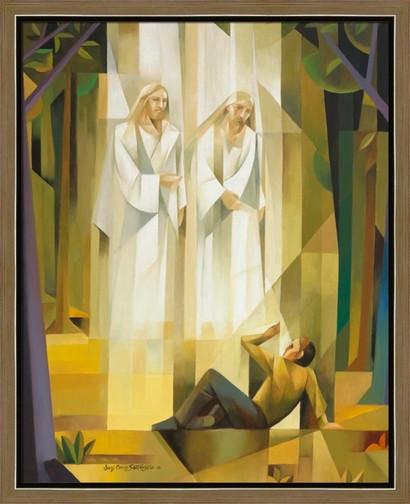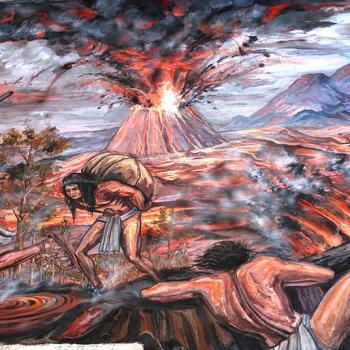
I have, incidentally, made an effort to discover the copyright status of this image, but have been unable to be certain of it. I’m assuming that my employment of it here constitutes an example of “fair use.” Authoritative communications to the contrary would be welcomed. I would like Jorge Cocco’s work to be better known in the Latter-day Saint community.
***
A little article of mine — the most recently published installment of my regular column for Meridian Magazine — has appeared in, well, Meridian Magazine. (You expected maybe Rolling Stone?) I hope that some of you might enjoy and even benefit from it:
“Why Latter-day Saints Cannot Disregard the Old Testament”
***
Two new pieces went up online today in Interpreter: A Journal of Latter-day Saint Faith and Scholarship:
“Honoring Joseph’s Theophany Two Centuries Later,” by Spencer Kraus
Review of Alexander L. Baugh, Steven C. Harper, Brent M. Rogers, and Benjamin C. Pykles, eds. Joseph Smith and his First Vision: Context, Place, and Meaning (Provo, UT: Religious Studies Center, Brigham Young University, Salt Lake City: Deseret Book, 2021). 289 pages. $27.99 (hardcover).
Abstract: In the year 2020, members of The Church of Jesus Christ of Latter-day Saints celebrated the 200th anniversary of the First Vision of the Prophet Joseph Smith. As a part of honoring that seminal moment in the Church’s history, the Church History Symposium focused on the context, place, and meaning of the First Vision. Selected papers from the conference have been published in Joseph Smith and his First Vision: Context, Place, and Meaning, edited by Alexander L. Baugh, Steven C. Harper, Brent M. Rogers, and Benjamin C. Pykles, offering new insights and research into Joseph Smith’s theophany in the Sacred Grove that has inspired millions worldwide to ask of God as Joseph did. The papers selected for publication are well-written and provide a great deal of new scholarship relating to the dramatic theophany that Joseph Smith experienced, and, as such, it is a great addition to any Latter-day Saint’s library.
“Covenant Theology for Latter-day Saints,” by Jasmin Gimenez Rappleye
Review of Kerry Muhlestein, God Will Prevail: Ancient Covenants, Modern Blessings, and the Gathering of Israel (American Fork, UT: Covenant Communications, 2021). 177 pages. $14.99 (hardcover).
Abstract: Covenants are central in the Latter-day Saint temple liturgy, our scriptural canon is infused with them, and General Authorities have increasingly drawn attention to their importance in the last half-century. Yet many Latter-day Saints are still unfamiliar with the form and function of covenants and the role they play in God’s plan of salvation. Kerry Muhlestein, well-informed by his academic training in ancient history and scripture, provides a lucid introduction to covenants for Latter-day Saints.
***
I was very pleased to see our good friend and Interpreter contributor Royal Skousen recently receive at least a small portion of the credit that is due to him for his decades of brilliant and meticulous labor on the textual history of the English-language Book of Mormon. At the very beginning of the video that is featured in the article to which I link immediately below, President Russell M. Nelson compliments him personally on the “good work” that he’s done, and then he’s shown speaking to the assembled group:
It has been an honor and a privilege to have been associated, even to a small degree, with what I’m convinced is one of the most solid and fundamental scholarly projects in the entire history of the Restoration. Royal sometimes chafes a bit under that kind of praise, but it’s abundantly well earned.
***
Trying to impose some order on my masses of notes, in the hope of making them genuinely available to myself (if nobody else) for future use, I ran across the two following quotations that both happen to come from people who taught for many years at the University of Oxford, in England. I believe that I’ve shared them here before but, even if I have, there seems no harm in sharing them here yet again:
“Faith is not a leap in the dark; it’s the exact opposite. It’s a commitment based on evidence. . . . It is irrational to reduce all faith to blind faith and then subject it to ridicule. That provides a very anti-intellectual and convenient way of avoiding intelligent discussion.”
John Lennox, Professor of Mathematics (Emeritus)
If, further, God’s purpose of identifying with our suffering and providing an example and instruction of how to live is to be fulfilled, he must show us that he is doing this. For God to bring to life someone condemned for a certain teaching would be to express his approval of that teaching. And since belief in the Resurrection . . . was clearly the force which led to the spread of the Gospel throughout so much of the world, if God brought this about his doing this constituted an intervention in history to make the life of Jesus successful. If God raised Jesus and thus gave impetus to the Church, which centrally thereafter taught that Jesus was God Incarnate (which there are also independent grounds for supposing Jesus to have implied), he showed that it was God himself who identified with our suffering. While the Resurrection would vindicate that and all the other teaching of Jesus, since a crucial element of that teaching concerned the availability for us ordinary humans of life after death, it would provide the first example of that to which it witnessed. Jesus was the forerunner. If God raised Jesus from the dead, he accepted his sacrifice and vindicated his teaching.
Richard Swinburne, Professor of Philosophy (Emeritus)
***
Finally, let me express some gratitude: Two pieces of personal news that could have been very bad — life-alteringly bad — came in on the very same day and were entirely positive. And, so, life goes on and, considerably relieved, we celebrate. Al-hamdu li-llah.
Posted from Newport Beach, California












